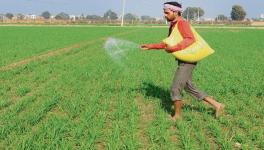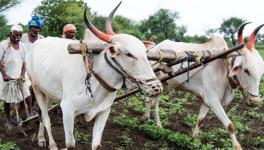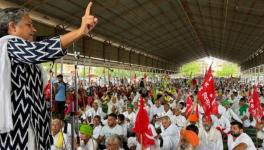How Kisan Kranti Can Unite Farmers Across India
Farmers gather to discuss agriculture crisis in Chennai, August 2021.Image Credit: Indra Shekhar Singh
The 10 am Chennai sun has the tarmac on a slow simmer. As the flight to Delhi taxis on the runway, the noon-like harshness burns our campaign-and-reporting-weary eyes. I turn to look, and farmer leaders Rakesh Tikait and Yudhvir Singh are napping in the rear of the plane. After five days and nights of a national convention on agrarian distress organised by the national water community and Tamil Nadu-based farmer organisations, they are going home. Amidst an ocean of clouds, reflections on the campaign float in: What did the conference achieve? Will the farmers of Tamil Nadu accept the call of the farmer leaders from North India to insist on the repeal of the three central legislations on agriculture and demand a legal guarantee for Minimum Support Prices?
Most of the participants in Chennai were farmers and their representatives from Karnataka, Kerala, Tamil Nadu, Andhra Pradesh and Telangana. Rakesh Tikait, Yudhvir Singh and Anuj Singh from Uttar Pradesh attended as emissaries of the Samyukt Kisan Morcha. So did farmers from a few other northern states. Rajendra Singh, the ‘Waterman’ of India, chaired the conference. Former Samajwadi Party MLA Krishna Kumar Singh and other regional stalwarts who work on water-related issues were also present. Farm experts Devinder Sharma and PV Rajagopal addressed the conference digitally.
After Chennai, the Tikait-led trio headed to the Tiruppur-Viluppuram sugarcane belt, eight hours to the west. Here, the most vital signals emerged that the farm protests are inching towards becoming a broader peoples’ movement. Land grab, assured Minimum Support Prices and corporatisation of agriculture were the major concerns that farmers from Tamil Nadu raised. Between Hindi, English, Tamil, and Kannada, the leaders managed to seed the idea that farmers’ struggles are over the same issues in the North or the South. The message against the three new farm laws is now embedded deep inside Tamil Nadu.
Farm leader Rakesh Tikait in Chennai, August 2021.Image Credit:Indra Shekhar Singh
But was that all? No. The first significant achievement of the conference was to forge a new alignment between the water rights movement in the North and South and between farmer’s rights groups and the Kisan Kranti front led by Tikait and other Bharatiya Kisan Union (BKU) leaders. Food and water are connected now. Water rights groups filled the halls in Chennai and promised support and solidarity from the South. Recall that Rajendra Singh and PV Rajagopal were part of the VM Singh-led splinter group, which held a press conference in Delhi on 4 August while the Kisan Sansad was on at Jantar Mantar. Now, Rajendra Singh has extended unconditional support to the Samyukt Kisan Morcha and included Tikait in the events in Tamil Nadu.
It is a victory of the farmers movement that more voices are joining to strengthen their movement. Now water, a crucial issue for farmers everywhere, is part of the plan, which could transform the anti-farm law movement into an even bigger people’s movement.
Unknown to many non-Tamil speaking states, the DMK regime has dedicated its new agriculture budget to the farmers’ movement. Farmers have many complaints in the state, but this gesture still holds the possibility of forging an alternative economic paradigm. For example, it will not be surprising if farmers and their leaders pressure other state governments for dedicated agriculture budgets. The DMK is also an anti-BJP force. Like the Opposition parties that extended support to the farmers earlier this year, this friendship can bolster the farmers’ demands. Its cadres attended Tikait’s rallies in Tamil Nadu, and even a meeting with Stalin was on the schedule.
By travelling across the state, Tikait has opened a new frontier for the SKM. He has connected Tamil farmers with Uttar Pradesh and Punjab’s farmers by addressing their shared grievances over sugarcane prices, inflated electricity bills and corporate-led land grabs. The corporate takeover of land in the name of development scars Tamil Nadu’s farmers. There are thousands of unresolved cases for compensation against power and power grid companies, and the farmers of Tamil Nadu are appealing for justice. Tikait also appealed to farmer leader Narayanswamy Naidu, the founder president of Bhartiya Kisan Union’s (BKU), evoking BKU’s roots to connect with the state’s people.
And connect, they did. On streets and trains alike, a selfie-frenzy had Tikait surrounded at all times. Despite the obvious Hindi-Punjabi-Tamil language barrier, hundreds flocked to hear him. The Tamil Kisan Kranti Yatra--as the group from Delhi calls their southern sojourn--was a reconnaissance trip and ground-breaking exercise rolled in one. Hopefully, it will open doors for new associations and a more extensive nationwide campaign for the SKM.
But what obstacles will such a campaign face? The first is language. The farmers need to adopt modern communication tools such as film and animation to translate their message into Tamil and other languages to spread their message. Translators and reliable local partners can help immensely, but the movement cannot dispense with the need for a Tamil Nadu-specific outreach campaign. Besides, the leaders cannot depend solely on the media to build the movement.
Obstacle two is reliable and effective local partners. The current campaign is marred by infighting, egos, clashes and power politics. There is disunity among local farmer groups, which makes the task of building unity more difficult. The once-mighty Ryot Sanghas of Karnataka suffer the same fate. But the SKM can find democratic and participatory solutions by inviting all Tamil farmer and rural unions, organisations and Farmer-Producer Organisations to the table. In a matter of one month, forty SKM leaders can easily cover Tamil Nadu’s 38 districts. They should take advantage of a state with a non-BJP government in power to align with local groups.
The All-India Kisan Sabha Coordination Committee (AIKSCC) and other Left groups and unions are already spreading awareness on the need for farmers to unite and oppose the Centre’s agricultural policies. Their farmer contingents have repeatedly visited Delhi’s borders from Tamil Nadu since the farm protests began last year, including one delegation the previous month.
A national movement needs representation from farmers, their supporters and well-wishers. The SKM needs to expand its core committees to include members from every state. Falling incomes, water shortages, non-remunerative prices, high input costs, land grabs and corporatisation, are the cause of the suffering of farmers everywhere. The sooner farmers realise they are victims of the same system, the sooner their revolution will spread. It is a moral imperative for the farmers protesting in Delhi, Punjab and Haryana to unite and let their Kranti embrace the farmers' struggles in Tamil Nadu. If they miss out, history will indeed judge them harshly.
Indra Shekhar Singh is an independent policy analyst and writer on agriculture and the environment. The views are personal.
Get the latest reports & analysis with people's perspective on Protests, movements & deep analytical videos, discussions of the current affairs in your Telegram app. Subscribe to NewsClick's Telegram channel & get Real-Time updates on stories, as they get published on our website.
























